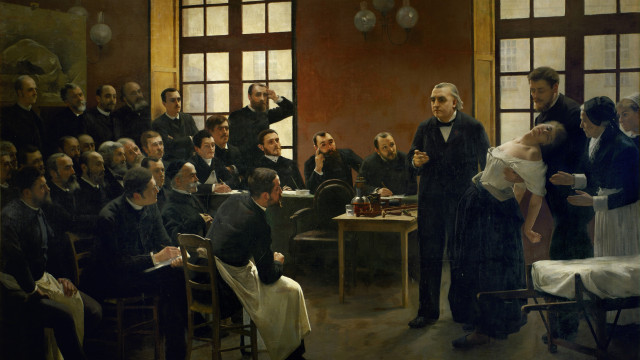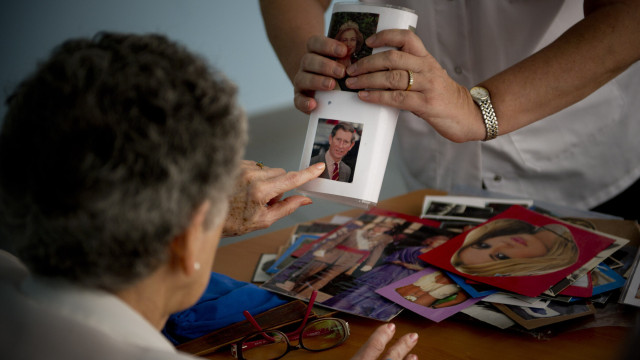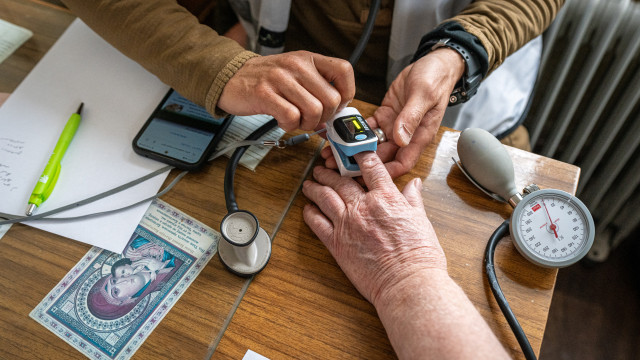






























See Also
See Again
© Shutterstock
0 / 31 Fotos
What is delusional disorder?
- Delusional disorder is a mental health condition. It manifests through the presence of one or more delusions. Delusions are beliefs that something is unquestionably true, regardless of lack of evidence, or evidence against it.
© Shutterstock
1 / 31 Fotos
Bizarre and non-bizarre delusions
- People who suffer from this type of psychotic disorder may suffer from bizarre or non-bizarre delusions. Bizarre delusions are those that are clearly implausible and that virtually no one believes to be true. An example would be someone believing their organs have been replaced (without any evidence of surgical intervention).
© Shutterstock
2 / 31 Fotos
Bizarre and non-bizarre delusions
- Non-bizarre delusions, on the other hand, contemplate possible (even if highly unlikely) scenarios, such as a person believing he/she is under police surveillance. There are also a number of types of delusional disorder, which are labeled according to the main theme of the delusions. Let’s take a look at them.
© Shutterstock
3 / 31 Fotos
Types of delusional disorder: erotomanic
- People who suffer from erotomania often believe that a person (often a famous person) is in love with them. Some celebrity stalkers suffer from erotomanic delusion.
© Shutterstock
4 / 31 Fotos
Types of delusional disorder: grandiose
- People who suffer from this type of delusional disorder believe their talents or exceptional insights are not recognized. They have an overinflated sense of power, self-worth, identity, or knowledge. They may also believe they have a special relationship with someone famous or with an entity like God.
© Shutterstock
5 / 31 Fotos
Types of delusional disorder: jealousy
- People who suffer from this type of delusional disorder believe their partner is unfaithful, despite a lack of evidence.
© Shutterstock
6 / 31 Fotos
Types of delusional disorder: persecutory
- Those with persecutory delusion believe there is someone spying on them, that they are being followed, mistreated, or that someone is attempting to harm them.
© Shutterstock
7 / 31 Fotos
Types of delusional disorder: somatic
- People who suffer from this type of delusional disorder believe there is something medically, physically, or biologically wrong with them. This may include a medical condition, bad odor, parasites or even insects crawling on or under the skin.
© Shutterstock
8 / 31 Fotos
Types of delusional disorder: mixed
- This is when a person suffers from more than one type of delusion, and none is dominant enough to be classified as one of the aforementioned.
© Shutterstock
9 / 31 Fotos
The difference between delusional disorder and schizophrenia
- Unlike schizophrenia, which is a spectrum of conditions that includes psychotic symptoms, delusional disorder’s only symptom is the delusions themselves.
© Shutterstock
10 / 31 Fotos
The difference between delusional disorder and schizophrenia
- In addition, schizophrenia may impact a person’s daily life, as symptoms may include disorganized speech or behavior, whereas those who suffer from delusional disorder don’t usually have their daily functioning impaired by their delusions.
© Shutterstock
11 / 31 Fotos
Who’s at risk?
- Delusional disorder mostly affects those in the middle to the later stages of life, with the average age being around 40.
© Shutterstock
12 / 31 Fotos
Who’s at risk?
- It affects both men and women. Men are more likely to suffer from persecutory and jealous types of delusional disorder, whereas women are more affected by the erotomanic type.
© Shutterstock
13 / 31 Fotos
Who’s at risk?
- Social isolation tends to play a role in the onset of delusional disorder. This includes people who suffer from visual impairment or deafness, immigrants who struggle with the language, and senior populations who tend to be more isolated.
© Shutterstock
14 / 31 Fotos
How common is it?
- Delusional disorder itself is fairly rare. Delusion, however, may be a symptom of other disorders, such as schizophrenia.
© Shutterstock
15 / 31 Fotos
What is the most common type of delusional disorder?
- The persecutory type, where people believe someone is out to get them, is the most common type of delusional disorder.
© Shutterstock
16 / 31 Fotos
Signs and symptoms
- As previously mentioned, the main symptom is an irrational belief in something that is not real. This may manifest in the early stages in several ways, including doubting the loyalty of friends and family.
© Shutterstock
17 / 31 Fotos
Signs and symptoms
- Other signs include a tendency to interpret seemingly harmless behaviors as threatening. People who suffer from delusional disorders may read benign remarks and events as suspicious and even hostile.
© Shutterstock
18 / 31 Fotos
What causes delusional disorder?
- It’s not possible to pinpoint a specific cause for delusional disorder. There are, however, factors that may contribute to its development. Let’s take a look at them.
© Shutterstock
19 / 31 Fotos
Causes: genetic factors
- Delusional disorder has been shown to be more common in people who have other family members with delusional disorder or other mental health issues such as schizophrenia.
© Shutterstock
20 / 31 Fotos
Causes: biological factors
- It is possible that some abnormalities in specific regions of the brain are linked with the development of delusion disorder. An imbalance in certain brain chemicals may also play a role.
© Shutterstock
21 / 31 Fotos
Causes: environmental and psychological factors
- Stress and trauma may be triggers of delusional disorder. The same goes for alcohol and substance abuse.
© Shutterstock
22 / 31 Fotos
Causes: environmental and psychological factors
- Ego defense mechanisms such as projection, reaction formation, and denial have also been linked to delusional disorder.
© Shutterstock
23 / 31 Fotos
Causes: environmental and psychological factors
- As previously mentioned, social isolation, as well as feelings of distrust, envy, suspicion, and low self-esteem, may also trigger the development of delusions.
© Shutterstock
24 / 31 Fotos
Diagnosis
- For a person to be diagnosed with delusional disorder, he/she must have experienced one or more delusions for one month or more. In addition, the delusion cannot be explained by any other condition.
© Shutterstock
25 / 31 Fotos
Diagnosis
- The healthcare provider will likely review the person's medical history, as well as review any medications or substances the person may consume. Some tests may be prescribed to rule out any other conditions.
© Shutterstock
26 / 31 Fotos
Diagnosis
- A referral to a psychiatrist or psychologist is usually the course of action in these cases. These professionals will be able to diagnose the mental health condition.
© Shutterstock
27 / 31 Fotos
Diagnosis
- While psychiatrists and psychologists have the knowledge and tools necessary to diagnose such cases, it’s not uncommon for delusional disorder to be misdiagnosed as other conditions, including schizophrenia, bipolar disorder, delirium, obsessive-compulsive disorder, and personality disorders.
© Shutterstock
28 / 31 Fotos
Treatment
- A combination of psychotherapy and medication is often required. But more often than not, those who suffer from delusions don’t seek help, as they don’t think there is anything wrong with them.
© Shutterstock
29 / 31 Fotos
Possible complications of delusional disorder
- While some forms of delusional disorder are not harmful to the individual or others, in some cases delusions may lead to complications. These may include depression, social isolation, harm to self and others (jealous and precursory types), as well as legal problems due to harassment or stalking. Sources: (Psychology Today) (Cleveland Clinic) (WebMD) See also: History's greatest minds and their struggles with mental health
© Shutterstock
30 / 31 Fotos
© Shutterstock
0 / 31 Fotos
What is delusional disorder?
- Delusional disorder is a mental health condition. It manifests through the presence of one or more delusions. Delusions are beliefs that something is unquestionably true, regardless of lack of evidence, or evidence against it.
© Shutterstock
1 / 31 Fotos
Bizarre and non-bizarre delusions
- People who suffer from this type of psychotic disorder may suffer from bizarre or non-bizarre delusions. Bizarre delusions are those that are clearly implausible and that virtually no one believes to be true. An example would be someone believing their organs have been replaced (without any evidence of surgical intervention).
© Shutterstock
2 / 31 Fotos
Bizarre and non-bizarre delusions
- Non-bizarre delusions, on the other hand, contemplate possible (even if highly unlikely) scenarios, such as a person believing he/she is under police surveillance. There are also a number of types of delusional disorder, which are labeled according to the main theme of the delusions. Let’s take a look at them.
© Shutterstock
3 / 31 Fotos
Types of delusional disorder: erotomanic
- People who suffer from erotomania often believe that a person (often a famous person) is in love with them. Some celebrity stalkers suffer from erotomanic delusion.
© Shutterstock
4 / 31 Fotos
Types of delusional disorder: grandiose
- People who suffer from this type of delusional disorder believe their talents or exceptional insights are not recognized. They have an overinflated sense of power, self-worth, identity, or knowledge. They may also believe they have a special relationship with someone famous or with an entity like God.
© Shutterstock
5 / 31 Fotos
Types of delusional disorder: jealousy
- People who suffer from this type of delusional disorder believe their partner is unfaithful, despite a lack of evidence.
© Shutterstock
6 / 31 Fotos
Types of delusional disorder: persecutory
- Those with persecutory delusion believe there is someone spying on them, that they are being followed, mistreated, or that someone is attempting to harm them.
© Shutterstock
7 / 31 Fotos
Types of delusional disorder: somatic
- People who suffer from this type of delusional disorder believe there is something medically, physically, or biologically wrong with them. This may include a medical condition, bad odor, parasites or even insects crawling on or under the skin.
© Shutterstock
8 / 31 Fotos
Types of delusional disorder: mixed
- This is when a person suffers from more than one type of delusion, and none is dominant enough to be classified as one of the aforementioned.
© Shutterstock
9 / 31 Fotos
The difference between delusional disorder and schizophrenia
- Unlike schizophrenia, which is a spectrum of conditions that includes psychotic symptoms, delusional disorder’s only symptom is the delusions themselves.
© Shutterstock
10 / 31 Fotos
The difference between delusional disorder and schizophrenia
- In addition, schizophrenia may impact a person’s daily life, as symptoms may include disorganized speech or behavior, whereas those who suffer from delusional disorder don’t usually have their daily functioning impaired by their delusions.
© Shutterstock
11 / 31 Fotos
Who’s at risk?
- Delusional disorder mostly affects those in the middle to the later stages of life, with the average age being around 40.
© Shutterstock
12 / 31 Fotos
Who’s at risk?
- It affects both men and women. Men are more likely to suffer from persecutory and jealous types of delusional disorder, whereas women are more affected by the erotomanic type.
© Shutterstock
13 / 31 Fotos
Who’s at risk?
- Social isolation tends to play a role in the onset of delusional disorder. This includes people who suffer from visual impairment or deafness, immigrants who struggle with the language, and senior populations who tend to be more isolated.
© Shutterstock
14 / 31 Fotos
How common is it?
- Delusional disorder itself is fairly rare. Delusion, however, may be a symptom of other disorders, such as schizophrenia.
© Shutterstock
15 / 31 Fotos
What is the most common type of delusional disorder?
- The persecutory type, where people believe someone is out to get them, is the most common type of delusional disorder.
© Shutterstock
16 / 31 Fotos
Signs and symptoms
- As previously mentioned, the main symptom is an irrational belief in something that is not real. This may manifest in the early stages in several ways, including doubting the loyalty of friends and family.
© Shutterstock
17 / 31 Fotos
Signs and symptoms
- Other signs include a tendency to interpret seemingly harmless behaviors as threatening. People who suffer from delusional disorders may read benign remarks and events as suspicious and even hostile.
© Shutterstock
18 / 31 Fotos
What causes delusional disorder?
- It’s not possible to pinpoint a specific cause for delusional disorder. There are, however, factors that may contribute to its development. Let’s take a look at them.
© Shutterstock
19 / 31 Fotos
Causes: genetic factors
- Delusional disorder has been shown to be more common in people who have other family members with delusional disorder or other mental health issues such as schizophrenia.
© Shutterstock
20 / 31 Fotos
Causes: biological factors
- It is possible that some abnormalities in specific regions of the brain are linked with the development of delusion disorder. An imbalance in certain brain chemicals may also play a role.
© Shutterstock
21 / 31 Fotos
Causes: environmental and psychological factors
- Stress and trauma may be triggers of delusional disorder. The same goes for alcohol and substance abuse.
© Shutterstock
22 / 31 Fotos
Causes: environmental and psychological factors
- Ego defense mechanisms such as projection, reaction formation, and denial have also been linked to delusional disorder.
© Shutterstock
23 / 31 Fotos
Causes: environmental and psychological factors
- As previously mentioned, social isolation, as well as feelings of distrust, envy, suspicion, and low self-esteem, may also trigger the development of delusions.
© Shutterstock
24 / 31 Fotos
Diagnosis
- For a person to be diagnosed with delusional disorder, he/she must have experienced one or more delusions for one month or more. In addition, the delusion cannot be explained by any other condition.
© Shutterstock
25 / 31 Fotos
Diagnosis
- The healthcare provider will likely review the person's medical history, as well as review any medications or substances the person may consume. Some tests may be prescribed to rule out any other conditions.
© Shutterstock
26 / 31 Fotos
Diagnosis
- A referral to a psychiatrist or psychologist is usually the course of action in these cases. These professionals will be able to diagnose the mental health condition.
© Shutterstock
27 / 31 Fotos
Diagnosis
- While psychiatrists and psychologists have the knowledge and tools necessary to diagnose such cases, it’s not uncommon for delusional disorder to be misdiagnosed as other conditions, including schizophrenia, bipolar disorder, delirium, obsessive-compulsive disorder, and personality disorders.
© Shutterstock
28 / 31 Fotos
Treatment
- A combination of psychotherapy and medication is often required. But more often than not, those who suffer from delusions don’t seek help, as they don’t think there is anything wrong with them.
© Shutterstock
29 / 31 Fotos
Possible complications of delusional disorder
- While some forms of delusional disorder are not harmful to the individual or others, in some cases delusions may lead to complications. These may include depression, social isolation, harm to self and others (jealous and precursory types), as well as legal problems due to harassment or stalking. Sources: (Psychology Today) (Cleveland Clinic) (WebMD) See also: History's greatest minds and their struggles with mental health
© Shutterstock
30 / 31 Fotos
Delusional disorder: when mental illness distorts reality
From jealousy to persecutory thoughts
© Shutterstock
A delusion is basically a false belief that something is real, despite irrefutable evidence of the contrary. Delusions can be a symptom of a number of mental health issues, but it's possible to have them as the only symptom. When this happens, the person may be suffering from a type of mental illness called delusional disorder. Delusional disorder can be divided into different types, including jealousy (those who believe their partner are cheating on them) and persecutory (those who have a paranoid belief that someone is out to get them), to name a few.
In this gallery, we delve into the different types of delusional disorder, as well as the possible causes and treatments. Click on to learn all about it.
RECOMMENDED FOR YOU




























MOST READ
- Last Hour
- Last Day
- Last Week








